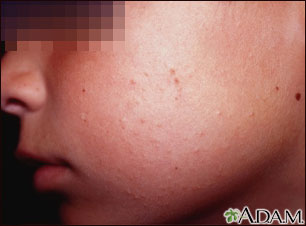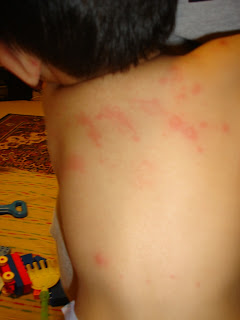Healthy Diet During Pregnancy Decreases Risk of Eczema and Wheeze in Baby
A Japanese study published in the European Journal of Allergy and Clinical Immunology (link: http://www3.interscience.wiley.com/journal/123251237/abstract?CRETRY=1&SRETRY=0) shows what many of us in the allergy world have suspected for a long time- mom's prenatal diet does have an impact of the risk of atopic manifestations in offspring at 16-24 months of age.
The study evaulated over 700 Japanese mother-child pairs. A diet-history questionnaire evaluated maternal consumption of fruits, vegetables, and antioxidants during pregnancy (at week 17). Atopic symptoms were evaluated based on criteria from the International Study of Asthma and Allergies in Childhood (at aged 16-24 months).
The study found that higher maternal intake of green and yellow vegetables, citrus fruit, and β-carotene during pregnancy was significantly associated with a reduced risk of eczema, but not wheeze, in the offspring. Maternal vitamin E consumption during pregnancy was significantly inversely related to the risk of infantile wheeze.
The authors concluded that maternal diet may reduce the risk of certain atopic manifestations in the offspring.
Although the results of this study are exciting, I do have a few concerns:
1) Self-reporting of diet history does introduce a risk of recall bias. Even in a scientific study, I fear that subjects are more likely to report a healthier than actual diet, the same way that we all tend to exaggerate to our physicians our actual rates of compliance with medication. So, if we're not actually having the patients write down what they are eating while they eat it (with a food diary, for example), are we really getting an accurate dietary history?
2) Because the study was done in a relatively homogeneous Japanese population, it doesn't account for genetic differences between different groups. We can't be certain that these results would be replicated in a genetically heterogeneous U.S. population.
These concerns notwithstanding, I still believe that this an important study, because it reminds us that what we put into our bodies has implications beyond our waistlines.
Future directions? I'd love to see a similar study done in a genetically diverse population, with a full dietary diary throughout the 9 months pf pregnancy. I'd also like to see this study done in multigravid women, so we can see if having a first child with atopy impacts the ability of diet to modify risk in a subsequent child.
As a mother of two allergic children, one with both eczema and wheezing, I'd be curious to know if my dietary choices played any role in my children's health. Full disclosure: Pregnancy #1- craved cottage cheese, yogurt, and produce. Pregnancy #2- craved cheeseburgers.
Guess who's itchy and wheezy?
The study evaulated over 700 Japanese mother-child pairs. A diet-history questionnaire evaluated maternal consumption of fruits, vegetables, and antioxidants during pregnancy (at week 17). Atopic symptoms were evaluated based on criteria from the International Study of Asthma and Allergies in Childhood (at aged 16-24 months).
The study found that higher maternal intake of green and yellow vegetables, citrus fruit, and β-carotene during pregnancy was significantly associated with a reduced risk of eczema, but not wheeze, in the offspring. Maternal vitamin E consumption during pregnancy was significantly inversely related to the risk of infantile wheeze.
The authors concluded that maternal diet may reduce the risk of certain atopic manifestations in the offspring.
Although the results of this study are exciting, I do have a few concerns:
1) Self-reporting of diet history does introduce a risk of recall bias. Even in a scientific study, I fear that subjects are more likely to report a healthier than actual diet, the same way that we all tend to exaggerate to our physicians our actual rates of compliance with medication. So, if we're not actually having the patients write down what they are eating while they eat it (with a food diary, for example), are we really getting an accurate dietary history?
2) Because the study was done in a relatively homogeneous Japanese population, it doesn't account for genetic differences between different groups. We can't be certain that these results would be replicated in a genetically heterogeneous U.S. population.
These concerns notwithstanding, I still believe that this an important study, because it reminds us that what we put into our bodies has implications beyond our waistlines.
Future directions? I'd love to see a similar study done in a genetically diverse population, with a full dietary diary throughout the 9 months pf pregnancy. I'd also like to see this study done in multigravid women, so we can see if having a first child with atopy impacts the ability of diet to modify risk in a subsequent child.
As a mother of two allergic children, one with both eczema and wheezing, I'd be curious to know if my dietary choices played any role in my children's health. Full disclosure: Pregnancy #1- craved cottage cheese, yogurt, and produce. Pregnancy #2- craved cheeseburgers.
Guess who's itchy and wheezy?



I wonder if the study takes into account prenatal vitamins. Can they replace the real deal? I was sick as a dog (vomiting up to 10 times a day type sick) for the first 28 weeks of my first pregnancy which dramatically influenced my dietary choices, as you can imagine. In my 25th week of this pregnancy and was hardly sick at all. So many different variables, but I'd love to know more about what the impact is/will be.
ReplyDeleteHealthy diet during pregnancy is very good for the baby prenatal. Eating a well balanced variety of vegetables and fruits is always very good. Such wonderful information you are giving here. Thanks a lot!
ReplyDelete